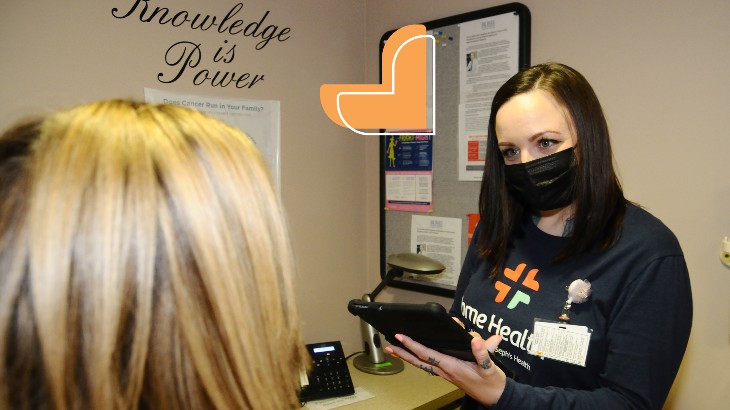
Knowledge is Power, and Knowing your Own Story is Half the Battle
Research has shown that certain risk factors may increase a person’s chances for developing cancer. Some risk factors can be controlled, like exposure to certain chemicals or tobacco use. Other factors are beyond our control, like age, personal history and family history.
Knowing your personal and family history of cancer is the first step in determining if you might be at increased risk. The Women’s Imaging Center at Rome Health provides enhanced screening to all breast imaging patients to determine hereditary risk factors for certain cancers.
The hereditary risk screening program is designed to help individuals and health care professionals make more informed decisions and take a personalized, proactive approach to care based on the results of genetic testing.
This program is designed to help individuals and health care professionals make more informed decisions and take a personalized, proactive approach to care based on the results of the hereditary cancer risk screening and genetic testing.
Specific guidelines set forth by The National Comprehensive Cancer Network, US Preventative Services Task Force, and American College of Obstetrics and Gynecology provide the framework for Rome Health's comprehensive cancer risk assessment program.
The program includes:
- A thorough evaluation of genetic and non-genetic factors that impact cancer risk
- Recommendations for and implementation of genetic testing
- Increased and enhanced cancer screening and management
- Accurate and up-to-date information about breast cancer risk and risk reduction strategies
Personal and family history of cancer, reproductive history and breast history is used to calculate a cancer risk assessment in patients with a family history of breast cancer.
Initially, female patients will be introduced to the program at the time of their breast imaging exam. You will be asked to complete a questionnaire about your personal and family history of cancer, reproductive history and breast history. This information will be use to calculate a cancer risk assessment for patients with a family history of breast cancer. Those who's family history indicates a higher risk will be recommended for genetic testing.
Patients participating in the program will be screened for 28 genetic mutations that impact hereditary risk for eight cancers including breast, ovarian, gastric, colorectal, pancreatic, melanoma, prostate and endometrial. The patient’s genetic results are available 4-6 weeks after screening, at which time patients may meet with Dr. John Restivo and Nurse Navigator, Kelly Pietryka, RN, to discuss findings and recommendations.
For more information about the hereditary cancer risk screening program and Rome Health's Medical Imaging Center, please contact Kelly Pietryka, Nurse Navigator, at (315) 338-7389.
Breast Health Nurse Navigator
1500 N. James St. Rome, NY 13440

